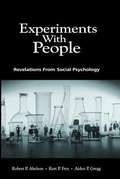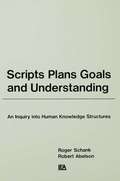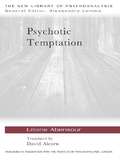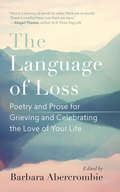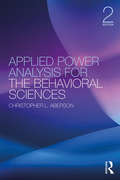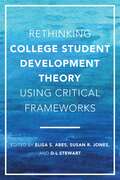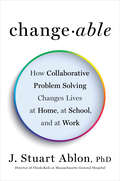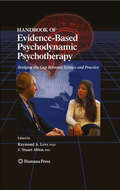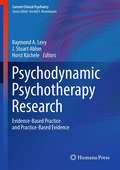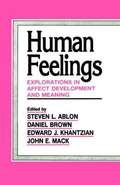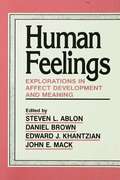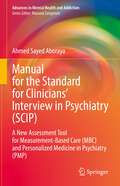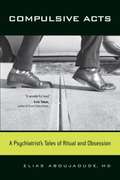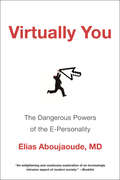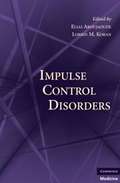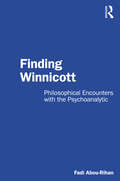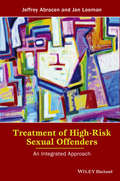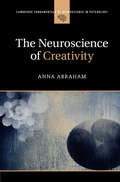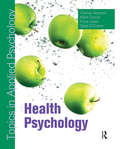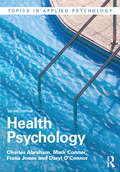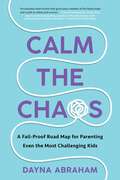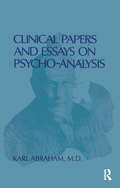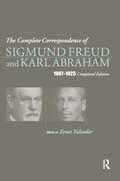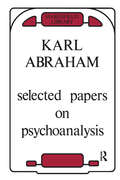- Table View
- List View
Experiments With People: Revelations From Social Psychology
by Robert P. Abelson Aiden P. Gregg Kurt P. FreyExperiments With People showcases 28 intriguing studies that have significantly advanced our understanding of human thought and social behavior. These studies, mostly laboratory experiments, shed light on the irrationality of everyday thinking, the cruelty and indifference of 'ordinary' people, the operation of the unconscious mind, and the intimate bond between the self and others. This book tells the inside story of how social psychological research gets done and why it matters. Each chapter focuses on the details and implications of a single study, but cites related research and real-life examples. All chapters are self-contained, allowing them to be read in any order. Each chapter is divided into: *Background--provides the rationale for the study;*What They Did--outlines the design and procedure used; *What They Found--summarizes the results obtained;*So What?--articulates the significance of those results; *Afterthoughts--explores the broader issues raised by the study; and*Revelation--encapsulates the 'take-home message' of each chapter.This paperback is ideal as a main or supplementary text for courses in social psychology, introductory psychology, or research design.
Scripts, Plans, Goals, and Understanding: An Inquiry Into Human Knowledge Structures (Artificial Intelligence Series)
by Robert P. Abelson Roger C. SchankFirst Published in 1977. Routledge is an imprint of Taylor & Francis, an informa company.
Psychotic Temptation (The New Library of Psychoanalysis)
by Liliane AbensourHow can we understand the pull towards that which we fear: psychosis? In this thought provoking book, Abensour proposes the idea of a temptation towards psychosis rather than a regression, as a response to the hatred or denial of the subject’s origins. She shares her reflections on her psychoanalytic work with psychotic patients focusing on their struggle to achieve a coherent sense of a self that can inhabit a shared world. Abensour locates this struggle within the universal human struggle to achieve a balance between what we can and cannot allow ourselves to know about the reality of death and of our insignificance in the world.
The Language of Loss: Poetry and Prose for Grieving and Celebrating the Love of Your Life
by Barbara AbercrombieWhen Barbara Abercrombie&’s husband died, she found the language of condolence irritating, no matter how well intended. &“My husband had not gone to a better place as if he were off on a holiday. He had not passed like clouds overhead, nor was he my late husband as if he&’d missed a train. I had not lost him as if I&’d been careless, and for sure, none of it was for the best.&” She yearned instead for words that acknowledged the reality of death, spoke about the sorrow and loneliness (and perhaps even guilt and anger), and might even point the way toward hope and healing. She found those words in the writings gathered here. The Language of Loss is a book to dip into and read slowly, a collection of poems and prose to lead you through the phases of grief. The selections follow an arc that mirrors the path of many mourners — from abject loss and feeling unmoored, to glimmers of promise and possibility, through to gratitude for the love they knew. These writings, which express what often feels ineffable, will accompany those who grieve, offering understanding and solace.
Applied Power Analysis for the Behavioral Sciences: 2nd Edition
by Christopher L. AbersonApplied Power Analysis for the Behavioral Sciences is a practical "how-to" guide to conducting statistical power analyses for psychology and related fields. The book provides a guide to conducting analyses that is appropriate for researchers and students, including those with limited quantitative backgrounds. With practical use in mind, the text provides detailed coverage of topics such as how to estimate expected effect sizes and power analyses for complex designs. The topical coverage of the text, an applied approach, in-depth coverage of popular statistical procedures, and a focus on conducting analyses using R make the text a unique contribution to the power literature. To facilitate application and usability, the text includes ready-to-use R code developed for the text. An accompanying R package called pwr2ppl (available at https://github.com/chrisaberson/pwr2ppl) provides tools for conducting power analyses across each topic covered in the text.
Rethinking College Student Development Theory Using Critical Frameworks
by Elisa S. Abes Susan R. Jones D. L. StewartA major new contribution to college student development theory, this book brings “third wave” theories to bear on this vitally important topic for anyone working on campus today. The book has three sections: The first briefly introduces the third wave theories that have recently expanded the frame of the topic; the second uses those theories to focus on specific aspects of student development; and the third brings it all together with a few chapters that look at the implications for practice. The first section includes a chapter that provides an overview of the evolution of student development theories as well as chapters describing the critical and post structural theories most relevant to the next iteration of student development theory. These theories include critical race theory, queer theory, feminist theories, intersectionality, decolonizing/indigenous theories, and crip theories. These chapters also include a discussion of how each theory is relevant to the central questions of student development theory. The second section provides critical interpretations of the primary constructs associated with student development theory. These constructs and their related ideas include resilience, dissonance, socially constructed identities, authenticity, agency, context, development (consistency/coherence/stability), and knowledge (sources of truth and belief systems). Each chapter begins with brief personal narratives on a particular construct; the chapter authors then re-envision the narrative’s highlighted construct using one or more critical theories. The third section will focus on implications for practice. Specifically, these chapters will consider possibilities for how student development constructs re-envisioned through critical perspectives can be utilized in practice. The primary audience for the book is faculty members who teach in graduate programs in higher education and student affairs and their students. It may also be of interest to faculty and graduate students in psychology, sociology, and ethnic studies, as well as women’s, gender, and sexuality studies departments. The book will also be useful to practitioners seeking guidance in working effectively with students across the convergence of multiple aspects of identity and development.
Changeable: How Collaborative Problem Solving Changes Lives at Home, at School, and at Work
by J. Stuart AblonA bold new way to help anyone change Why is it so hard to change problem behavior—in our kids, our colleagues, and even ourselves? Conventional methods often backfire, creating a downward spiral of resentment and frustration, and a missed opportunity for growth. What if the thinking behind these old methods is wrong? What if people don’t misbehave because they want to, but because they lack the skills to do better? Or as renowned psychologist J. Stuart Ablon asks, what if changing problem behavior is a matter of skill, not will? Based on more than twenty-five years of clinical work with juvenile offenders as well training parents, teachers, counselors and law enforcement, and supported by research in neuroscience, Changeable presents a radical new way of thinking about challenging and unwanted behavior -- Collaborative Problem Solving -- that builds empathy, helps others reach their full potential, and most of all really works. With illuminating scientific evidence, remarkable success stories, and actionable insights, Changeable gives parents, teachers, CEOs and anyone interested in learning about why we behave the way we do a roadmap for helping people grow. *Includes a Bonus PDF with charts and graphs.
Handbook of Evidence-Based Psychodynamic Psychotherapy
by J. Stuart Ablon G. O. Gabbard Raymond A. LevyThe importance of conducting empirical research for the future of psychodynamics is presented in this excellent new volume. In Handbook of Evidence Based Psychodynamic Psychotherapy: Bridging the Gap Between Science and Practice, the editors provide evidence that supports this type of research for two primary reasons. The first reason concerns the current marginalization of psychodynamic work within the mental health field. Sound empirical research has the potential to affirm the important role that psychodynamic theory and treatment have in modern psychiatry and psychology. The second reason that research is crucial to the future of psychodynamic work concerns the role that systematic empirical investigations can have in developing and refining effective approaches to a variety of clinical problems. Empirical research functions as a check on subjectivity and theoretical alliances in on-going attempts to determine the approaches most helpful in working with patients clinically. Handbook of Evidence Based Psychodynamic Psychotherapy: Bridging the Gap Between Science and Practice brings together a panel of distinguished clinician-researchers who have been publishing their findings for decades. This important new book provides compelling evidence that psychodynamic psychotherapy is an effective treatment for many common psychological problems.
Psychodynamic Psychotherapy Research
by J. Stuart Ablon Raymond A. Levy Horst KächelePsychodynamic Psychotherapy Research: Evidence-Based Practice and Practice-Based Evidence continues the important work of the first book published in 2009 by Humana Press (Handbook of Evidence-Based Psychodynamic Psychotherapy: Bridging the Gap Between Science and Practice). This landmark title presents in one volume significant developments in research, including neuroscience research, in psychodynamic psychotherapy by a team of renowned clinician-researchers. The demand for ongoing research initiatives in psychodynamic psychotherapy from both internal and external sources has increased markedly in recent years, and this volume continues to demonstrate the efficacy and effectiveness of a psychodynamic approach to psychotherapeutic interventions in the treatment of psychological problems. The work in this volume is presented in the spirit of ongoing discussion between researchers and clinicians about the value of specific approaches to specific patients with specific psychiatric and psychological problems. Multiple forms of treatment interventions have been developed over the past fifty years, and this volume makes clear, with firm evidence, the authors' support for the current emphasis on personalized medicine. Groundbreaking and a major contribution to the psychiatric and psychologic literature, Psychodynamic Psychotherapy Research: Evidence-Based Practice and Practice-Based Evidence provides firm grounding for advancing psychodynamic psychotherapy as a treatment paradigm.
Human Feelings: Explorations in Affect Development and Meaning
by Steven L. Ablon Daniel Brown Edward J. Khantzian John E. MackDwelling on the importance of emotions in our life, the author through Harvard Affect Study Group has brought together people with different kinds of training to share a passionate interest in the study of affect.
Human Feelings: Explorations in Affect Development and Meaning
by Steven L. Ablon Daniel Brown John E. MackHuman Feelings provides a comprehensive overview of the role of emotions in human life. Growing out of the research and writing of members of the Harvard Affect Study Group, the volume brings to bear different disciplinary outlooks and different modes of inquiry on various aspects of human affective experience. The book opens with an section of "Theoretical Considerations" that includes an overview of affective development across the life cycle, an examination of affect and character, and an empirical analysis of gender differences in the expression of emotion. A series of clinical reports involving patients in different age groups comprises the next section, "Affect and the Life Cycle." Subsequent sections on "Trauma, Addiction, and Psychosomatics" and "Transformations of Affect" traverse the realms of neurobiology, addictive suffering, stress disorders, epistemology, creativity, and social organization. A final section, "New Directions," further extends the frontiers of inquiry into nonordinary states of consciousness and the vicissitudes of well-being. An integrative collection of multidisciplinary sweep and scholarly integrity, Human Feelings is a readable source book that brings together rigorous theoretical and developmental studies, experientially vivid self-reporting, and a wealth of illustrative clinical material. An invaluable addition to the libraries of mental health professionals and developmental researchers, this volume will be illuminating for philosophers, social and political scientists, and lay readers as well.
Cambridge Approaches to Language Contact: The Emergence of Hybrid Grammars
by Enoch Oladé AbohChildren are extremely gifted in acquiring their native languages, but languages nevertheless change over time. Why does this paradox exist? In this study of creole languages, Enoch Aboh addresses this question, arguing that language acquisition requires contact between different linguistic sub-systems that feed into the hybrid grammars that learners develop. There is no qualitative difference between a child learning their language in a multilingual environment and a child raised in a monolingual environment. In both situations, children learn to master multiple linguistic sub-systems that are in contact and may be combined to produce new variants. These new variants are part of the inputs for subsequent learners. Contributing to the debate on language acquisition and change, Aboh shows that language learning is always imperfect: learners' motivation is not to replicate the target language faithfully but to develop a system close enough to the target that guarantees successful communication and group membership.
Manual for the Standard for Clinicians’ Interview in Psychiatry: A New Assessment Tool for Measurement-Based Care (MBC) and Personalized Medicine in Psychiatry (PMP) (Advances in Mental Health and Addiction)
by Ahmed Sayed AborayaThe SCIP manual will introduce a new assessment tool designed to be compatible with 21st century advances in measurement-base care (MBC) and personalized medicine in psychiatry (PMP). The SCIP includes 18 clinician-administered and 15 self-administered reliable and validated scales covering most adult symptom domains: anxiety, obsessions, compulsions, posttraumatic stress, depression, mania, delusions, hallucinations, disorganized thoughts, aggression, negative symptoms, alcohol use, drug use, attention deficit/hyperactivity, and eating disorders. Mental health professionals (psychiatrists, psychiatry residents, psychologists, therapists, clinical social workers, counselors, nurses, nurse practitioners, physician assistants, professors, students, and mental health researchers) are the primary audience of the manual. These professionals will be able to implement SCIP scales in their practice and use the SCIP psychopathology glossary as part of the emerging science of personalized medicine psychiatry (PMP).Existing books on measures and rating scales, such as the two books above, describe different scales developed by different authors at different periods. Each scale has its own rating guidelines and training requirements, which must be followed by clinicians in order to use the scales. This demands a considerable amount of time for clinicians and can be a barrier to using the scales in practice. Even within the same psychopathology domain, many published measurement scales exist. For instance, the book published by Waters and Stephane includes 120 scales for psychosis. Among the 120 scales for psychosis, which scale(s) should the clinician choose? Our proposed manual will remove these barriers by creating simple and universal principles which allow readers to use the 33 reliable and validated SCIP scales with most adult psychiatric disorders. There will be 15 videotaped interviews available online for readers who buy the book. Readers are expected to watch the interviews in conjunction with reading the manual.
Compulsive Acts: A Psychiatrist's Tales of Ritual and Obsession
by Elias AboujaoudeIn this book, we meet a man who can't let anyone get within a certain distance of his nose, two kleptomaniacs from very different walks of life, an Internet addict who chooses virtual life over real life, a professor with a dangerous gambling habit, and others with equally debilitating compulsive conditions. Elias Aboujaoude tells stories inspired by memorable patients he has treated, taking us from initial contact through the stages of the doctor-patient relationship.
Virtually You: The Dangerous Powers of the E-Personality
by Elias Aboujaoude"Instantly engaging and eminently accessible . . . . an enlightening and cautionary exploration of an increasingly intrusive aspect of modern society." --Booklist While the Internet can enhance well-being, Elias Aboujaoude has spent years treating patients whose lives have been profoundly disturbed by it. Part of the danger lies in how the Internet allows us to act with exaggerated confidence, sexiness, and charisma. Aboujaoude dubs this new self our "e-personality" and argues that its traits are too potent to be confined online. Offline, too, we're becoming impatient, unfocused, and urge-driven. Virtually You draws from Aboujaoude's personal and professional experience to highlight this new phenomenon. The first scrutiny of the virtual world's transformative power on our psychology, Virtually You demonstrates how real life is being reconfigured in the image of a chat room, and how our identity increasingly resembles that of our avatar.
Impulse Control Disorders
by Elias Aboujaoude Lorrin M. KoranIn the last decade, much needed attention and research has been focused on the group of psychiatric conditions termed "impulse control disorders" or ICDs. Pathological gambling, compulsive shopping, kleptomania, hypersexuality, Internet "addiction," among other disorders, are characterized by a recurrent urge to perform a repetitive behavior that is gratifying in the moment but causes significant long-term distress and disability. Despite the high rate of co-morbidity with obsessive compulsive disorder, ICDs are now clearly distinguished from these disorders with a unique clinical approach for diagnosis and treatment. A wide array of psychopharmacologic and psychotherapeutic options is now available for treating these disorders. Drs. Elias Aboujaoude and Lorrin M. Koran have compiled the world's foremost experts in ICD research and treatment to create a comprehensive book on the frequency, evolution, treatment, and related public policy, public health, forensic, and medical issues of these disorders. This is the first book to bring together medical and social knowledge bases related to impulse control disorders.
Finding Winnicott: Philosophical Encounters with the Psychoanalytic
by Fadi Abou-RihanIn Finding Winnicott: Philosophical Encounters with the Psychoanalytic, Fadi Abou-Rihan expands upon Winnicott’s category of the found object and argues that a genuine understanding of the analyst’s own thought requires that it be considered in relation to that of another. The essays in this collection are in dialogue with the work of Freud, Deleuze and Guattari, Laplanche, Bonaventure, Ibn Al-’Arabi, and Huizinga; these encounters showcase some of Winnicott’s yet unexplored contributions to the questions of subjectivity, time, and language. They weave psychoanalytic theory, clinical vignette and key moments from the history of ideas in order to shed light on our findings regarding, and indeed findings of, desire, on some of the playful but no less compelling ways in which the subject lives, suffers, understands, questions and/or normalizes desire. Chapters span a range of topics including rationales, findings and spaces, and highlight the subject as not only that which finds but that which is found. With clinical vignettes throughout, this book is vital reading for practicing analysts, as well as analysts in training and students of both philosophy and psychoanalysis.
Treatment of High-Risk Sexual Offenders
by Jeffrey Abracen Jan LoomanTreatment of High-Risk Sexual Offenders addresses concrete management strategies, from initial intake to community treatment programs, and describes a detailed program for high risk offenders which has been developed, tested and refined for over 15 years. Provides a thorough review of contemporary theory and research relating to complex, challenging populations, and translates it into a comprehensive system of assessment and treatment for high risk sexual offenders Offers detailed coverage of setting and staff requirements, the importance of the therapeutic alliance, and how to balance individual therapy with group components in order to develop social and self-management skills Builds on the principle of integrative care, drawing on the established Risk-Need-Responsivity (RNR) model for offender assessment and rehabilitation but adding new components of CBT and motivational interviewing Includes a complete assessment battery and strategies for managing serious mental illness and comorbidity
The Neuroscience of Creativity (Cambridge Fundamentals of Neuroscience in Psychology)
by Anna AbrahamWhat happens in our brains when we compose a melody, write a poem, paint a picture, or choreograph a dance sequence? How is this different from what occurs in the brain when we generate a new theory or a scientific hypothesis? In this book, Anna Abraham reveals how the tools of neuroscience can be employed to uncover the answers to these and other vital questions. She explores the intricate workings of our creative minds to explain what happens in our brains when we operate in a creative mode versus an uncreative mode. The vast and complex field that is the neuroscience of creativity is disentangled and described in an accessible manner, balancing what is known so far with critical issues that are as yet unresolved. Clear guidelines are also provided for researchers who pursue the big questions in their bid to discover the creative mind.
Health Psychology: Critical Concepts In Psychology (Topics in Applied Psychology)
by Charles AbrahamTopics in Applied Psychology offers a range of accessible, integrated texts ideal for courses in applied psychology. The books are written by leading figures in their field and provide a comprehensive academic and professional insight into each topic. They incorporate a range of features to bring psychology to life including case histories, research methods, ethical debate and learner activities. Each chapter opens with learning objectives to consolidate key points. A reading list and sample essay questions at the end of chapters enable further independent study. The series also offers an appreciation of multiple perspectives, examines the relationship between psychology and other cognate disciplines and discusses recent developments in each field. Topics in Applied Psychology will provide you with the tools you need to engage with, enjoy and understand your applied psychology discipline, ultimately ensuring confidence and success in exams as well as a comprehensive grounding in the profession. Health Psychology guides the reader through core issues in health psychology research and practice. Each chapter builds on previous ones so that the text provides an overview of the field rather than presenting a compendium of topics. The book discusses mechanisms, models and methods and examines how biological, cognitive, affective and social processes impact on health and illness. It also explores how stress and coping mechanisms affect health behaviours and the psychological determinants of health behaviour. Two chapters focus on how psychological research can be applied to change health-related attitudes and behaviours. Communication between the patient and practitioner is examined as is the role of the health psychologist. The integrated and interactive approach, combined with the comprehensive coverage, make this book the ideal companion for courses in health psychology.Other books in the series include: Clinical Psychology, Criminal Psychology, Educational Psychology, Organizational and Work Psychology and Sport and Exercise Psychology.
Health Psychology (Topics in Applied Psychology)
by Charles Abraham Mark Conner Fiona Jones Daryl O'ConnorThe new edition of Health Psychology is the perfect introduction to this rapidly developing field. Throughout the book, the psychological processes that shape health-related behaviours, and affect core functions such as the immune and cardiovascular systems, are clearly explained. These relationships provide the foundation for psychological interventions which can change cognition, perception and behaviour, thereby improving health. The book is split into five sections, and builds to provide a comprehensive overview of the field: the biological basis of health and illness stress and health coping resources: social support and individual differences motivation and behaviour relating to patients Extensively revised to include new material on behavioural change, the role of stress, resilience and social support, recovery from work, and the care of people with chronic disease, the book also includes a range of features which highlight key issues, and engage readers in applying what we have learned from research. This is essential reading for any undergraduates studying this exciting field for the first time, and the perfect primer for those embarking on postgraduate study.
Calm the Chaos: A Fail-Proof Road Map for Parenting Even the Most Challenging Kids
by Dayna AbrahamA simple, fail-proof road map for parents raising even the most challenging children from the founder of the life-changing Calm the Chaos methodology and the Lemon Lime Adventures blog.Strong-willed, spirited, explosive, and highly sensitive are just a few of the most common labels for challenging kids. Whether your child has been diagnosed with a behavioral condition, labeled, or is just harder than other children you&’ve met, you are in luck. Parenting expert, Dayna Abraham is here to help. Calm the Chaos is a clearly organized, methodical approach to parenting. Dayna has created a road map to help parents find peace and meet their kids where they are at when conventional parenting tools have failed. There are five steps to calming the chaos—Getting to Safety, Restoring Trust and Energy, Finding Calm in the Moment, Getting Ahead of the Moment, and Defining Family Success. Each step employs a framework that is easy to remember, even when emotions run high: you ground yourself, you connect with your kid, you work with them to understand the catalyst and the issue at the heart, and then together you get curious about finding an empowered solution. Backed by science and tested by hundreds of thousands of families, Calm the Chaos is a revolutionary road map complete with in-the-trenches stories, scripts, prompts, and worksheets that make it simple for parents to build a safe home and support healthy kids.
Clinical Papers and Essays on Psychoanalysis (Classics In Psychoanalysis Ser.)
by Karl AbrahamThis book is a collection of the works of Dr. Karl Abraham's writings. It covers the sexual trauma in childhood for the symptomatology of dementia praecox, the significance of intermarriage between close relatives in the psychology of the neuroses, psycho-analysis, and a study in folk-psychology.
The Complete Correspondence of Sigmund Freud and Karl Abraham 1907-1925
by Karl AbrahamKarl Abraham was an important and influential early member of Freud’s inner circle of trusted colleagues. As such he played a significant part in the establishment of psychoanalysis as a recognised and respected discipline. Regarded by Ernest Jones as one of the best clinical analysts among his contemporaries1 he also elaborated and expanded upon Freud’s theories. Exploring first-hand the complex relationship and rivalries that existed not only between Freud and his master pupil, but also the details of their combined and individual relationships with Jung, this substantial and absorbing collection of letters enables the reader to gain valuable insights into these two pioneers of psychoanalysis.‘Since psychoanalysis is established as an essential part of the history of ideas for the last century, intellectual historians should relish the fact that an absolutely excellent and full edition of this correspondence has finally come out.’
Selected Papers on Psychoanalysis
by Karl AbrahamCovering a wide range of topics, the collection consists of twenty-six papers and essays published over a period of two decades. Readers of this book are thus enabled to trace the analyst's development, in which his scientific approach is evident throughout, from his earliest papers through to his last works. First published in 1927 in the International Psychoanalytical Library, the author's Selected Papers on Psychoanalysis has since established itself as on of the seminal works essential to the training of workers in the psychoanalytic field. Includes the author's classic paper A Short Study of the Development of the Libido.
